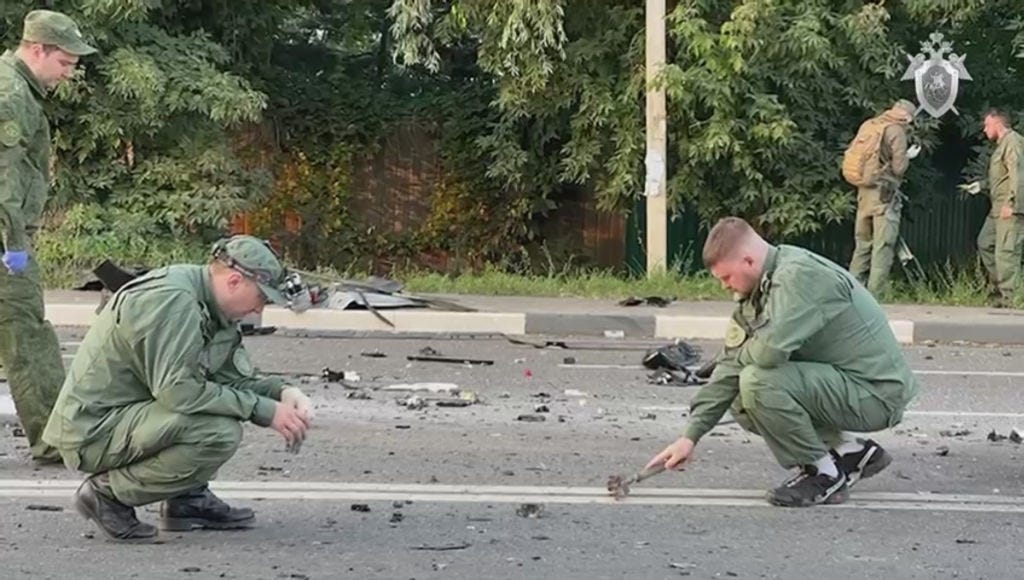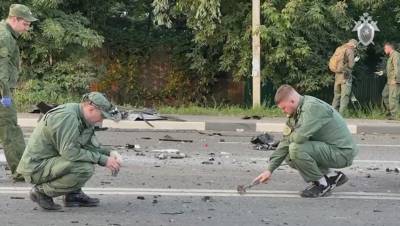Days after a car bomb detonated and killed Daria Dugina, the daughter of Alexander Dugin, on her drive home from a Russian culture festival outside of Moscow, there are more questions than answers regarding the circumstances of her death.
First, a word about Alexander Dugin (who might have been the real target of the assassination, as the two were reportedly supposed to have driven back home from the “Tradition” festival together). He is a Russian ideologue known in the West for his commentaries on Russian ideology and strategy. He is not, however, “Putin’s brain” or a “close adviser to Putin,” as many Western journalists have written. He is a pseudo-intellectual hack who speaks good English, good enough to use big words in a manner that a certain kind of graduate student might plausibly find coherent. The centerpiece of his rhetoric over the last few decades has been “Eurasianism” or “neo-Eurasianism”, which calls for building a Eurasian empire to challenge the supremacy of the United States and the “Atlanticists.”
There is a lot more guff and interlocking strands of polysyllabic time-wasting sentences to it than that summary, and Dugin connoisseurs will be shocked at my dismissal. The fact remains that if you read the speeches of Putin, Russian Defense Minister Sergei Shoigu, Putin ally and Security Council Secretary Nikoloai Patrushev, etc., and study Russian newscasts and official documents, one is hard-pressed to find much of a Dugin signature outside of some caterwauling on Russian pseudo-news-debate shows. I confess, I used to take Dugin much more seriously. I used to read his books and articles closely, looking for some kind of clue about the direction of Putin’s regime or the next steps of the Kremlin. I gradually realized that Dugin was a follower, not a leader in any sense of the word. His role is not to blaze a trail but to justify whatever Putin is already doing to a particular set of audiences, through phrases designed to appeal to right wingers and anti-American esotericists and mystics (there is a lot of overlap among these groups).
So why kill his daughter then? Again, it is possible that she was not the target. On the other hand, she was a minor figure in the Russian commentariat, appearing on nationalist TV stations and writing opinion pieces in the fashion of her father. She visited Donetsk and Mariupol this summer and gloated about how the “globalists had lost” to limited online audiences, but that hardly would make her a likely target.
On Monday the Kremlin let us know the official story, at least the first draft: Daria Dugina was killed by a Ukrainian mother-daughter assasination team dispatched by Ukrainian intelligence. The pair arrived in Russia and got an apartment near Daria Dugina’s, followed her to the “Tradition” festival, then planted and remotely detonated the bomb. The duo then managed to drive their Mini Cooper to Estonia, escaping justice.
An interesting, very linear tale. It might even be true. However, the choice of Dugina as target is strange. It’s true she was probably a lot easier to get at than many other Russians. But to use a WWII analogy, it is as if the allies developed the capability to assassinate someone right outside of Berlin, and took an attempt not at Goebbels or Lord Haw-Haw or someone connected to the German arms industry or military, but instead tried to kill some sycophantic intellectual like Nazi political theorist Carl Schmitt—or Schmitt’s daughter, someone to whom most Germans hardly gave a thought.
Still, Ukrainians are perfectly capable of doing stupid things, and it is also possible that Dugin’s disproportionate prominence in the West has bled over to some Ukrainian planners paying too much attention to him.
On Sunday came the first and so far only claim of responsibility for the attack—supposedly from a new group that calls itself the “National Republican Army” (NRA). In its manifesto the NRA declares Putin “a usurper of power and a war criminal who amended the Constitution, unleashed a fratricidal war between Slavic peoples and sent Russian soldiers to certain and senseless death. … Putin will be deposed and destroyed by us!” The group threatens employees of the state and their “accomplices” and identifies those who don’t speak publicly against the war as its enemies. According to this statement, this “army” has carried out a number of sabotage actions within Russia, and they merely chose this moment to reveal themselves.
This claim of responsibility was put forward by Ilya Ponomarev, a Russian opposition figure and former Communist (until 2007) who was the only Russian member of parliament to vote against Russia’s seizure of Crimea in 2014. He fled Russia for Kyiv a while later and has lived there since, receiving Ukrainian citizenship in 2019. He claims that his Russian opposition organization has been in touch with the NRA since April 2022, initially through Telegram.
An interesting development for sure, but is it real? Could this be a cover for Ukrainian intelligence? Sure, why not. (In accusing the mother-daughter team, the FSB—if it’s not lying—might have just revealed how easy it is for Ukrainians to sneak bombs into Russia and blow up stuff up.) Could it be an authentic organization? Also possible, of course. Could it be a Russian front? Also possible. As this story develops, expect to hear more about “Operation Trust”—a long-running Soviet intelligence operation in the 1920s that fooled much of the world into believing there was a secret anti-Soviet resistance organization called the “Monarchist Union of Central Russia.” This was actually a front that the Soviets used to divert resources, lure back exiles for arrest, and spread disinformation. When I heard that someone had tried to assassinate Dugin, this was where my mind went initially—it is a perfect way to raise the profile of someone in the eyes of the West (Dugin) and/or gain credibility for some network, all while not sacrificing anyone actually of value to the Kremlin.
It is far too early to draw any conclusions based on public data, and we should be wary of being drawn into stories of plots within plots and loop-de-loops of intrigue. We should watch the reaction of Kremlin propaganda to this killing carefully, especially watching for any divergence between the messages and volume they feed to the West as compared with Russian audiences.
The killing of Daria Dugina is bigger than a tempest in a teacup, but it does not change much of anything about Putin’s war in Ukraine. Possibly this is a prelude of an escalation toward more bombings and assassinations in Europe (which Russian agents have been carrying out for years and years), or a sign that Ukrainian intelligence is taking the fight to Moscow, or even a sign of infighting in Russian wacko-right-wing circles. (This last idea got some play on social media initially, but seems to have fallen by the wayside.) In sum, it is a high-profile distraction created by the murder of a low-profile person, designed, in one way or another, to make a disproportionate splash and/or distract people from the actual fight. Support the Ukrainians and give them weapons to fight and wear down the Russian army. Don’t pay this bombing too much heed yet.





Please note that we at The Dispatch hold ourselves, our work, and our commenters to a higher standard than other places on the internet. We welcome comments that foster genuine debate or discussion—including comments critical of us or our work—but responses that include ad hominem attacks on fellow Dispatch members or are intended to stoke fear and anger may be moderated.
With your membership, you only have the ability to comment on The Morning Dispatch articles. Consider upgrading to join the conversation everywhere.